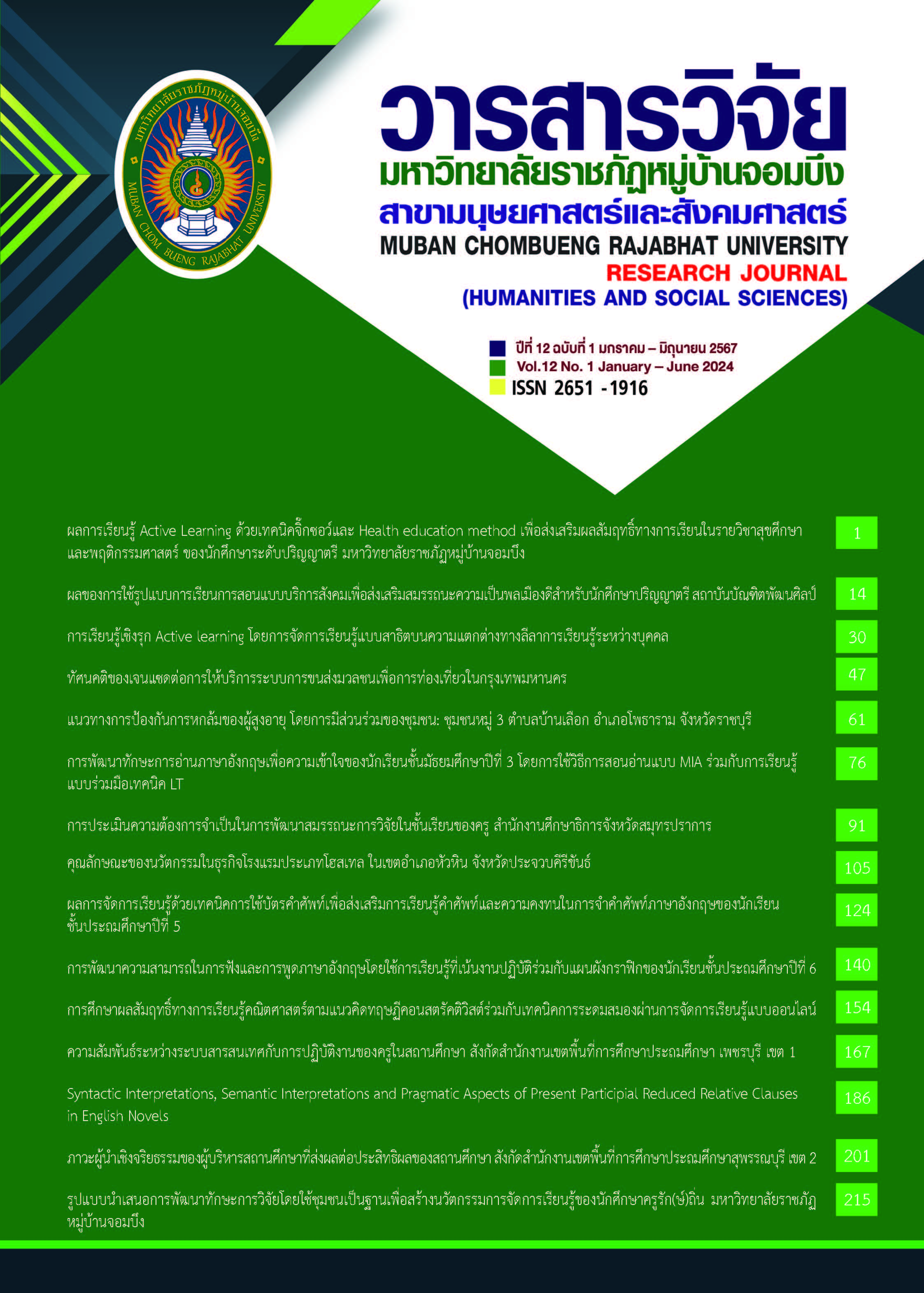ผลการจัดการเรียนรู้ด้วยเทคนิคการใช้บัตรคำศัพท์เพื่อส่งเสริมการเรียนรู้คำศัพท์และความคงทนในการจำคำศัพท์ภาษาอังกฤษของนักเรียนชั้นประถมศึกษาปีที่ 5
คำสำคัญ:
เทคนิคการใช้บัตรคำศัพท์, ความคงทนในการจำคำศัพท์, นักเรียนชั้นประถมศึกษาปีที่ 5บทคัดย่อ
การวิจัยมีวัตถุประสงค์เพื่อ 1) เพื่อเปรียบเทียบผลการเรียนรู้คำศัพท์ภาษาอังกฤษก่อนและหลังเรียน 2) เพื่อศึกษาความคงทนในการจำคำศัพท์ภาษาอังกฤษ 3) เพื่อศึกษาความพึงพอใจของนักเรียนที่มีต่อการจัดการเรียนรู้ด้วยเทคนิคการใช้บัตรคำศัพท์ กลุ่มตัวอย่างที่ใช้ในการวิจัย ได้แก่ นักเรียนชั้นประถมศึกษาปีที่ 5 โรงเรียนวัดสรรเพชญ ปีการศึกษา 2564 จำนวน 1 ห้องเรียน ที่ได้มาจากการเลือกแบบกลุ่ม (Intact-group comparison) โดยเลือกจากนักเรียนที่สามารถมาเรียน On site ที่โรงเรียนได้ตามมาตรการการป้องกันการแพร่ระบาดของเชื้อไวรัสโคโรนา 2019 เครื่องมือที่ใช้ได้แก่ 1) แผนการจัดการเรียนรู้โดยเทคนิคการใช้บัตรคำศัพท์ 6 แผน แผนละ 1 ชั่วโมง 2) บัตรคำศัพท์สำหรับครู และนักเรียน 3) แบบทดสอบวัดผลสัมฤทธิ์ทางการเรียนรู้คำศัพท์ 4) แบบวัดความพึงพอใจ
ผลวิจัยพบว่า 1) ผลสัมฤทธิ์ทางการเรียนรู้คำศัพท์โดยเทคนิคการใช้บัตรคำศัพท์หลังเรียนสูงกว่าก่อนเรียนอย่างมีนัยสำคัญทางสถิติที่ระดับ .05 2) ความคงทนในการเรียนรู้คำศัพท์โดยเทคนิคการใช้บัตรคำศัพท์หลังเรียนไปแล้ว 2 สัปดาห์ไม่แตกต่างกันกับการทดสอบหลังเรียน 3) ความพึงพอใจของนักเรียนที่มีต่อการเรียนโดยใช้เทคนิคการใช้บัตรคำศัพท์มีความพึงพอใจในระดับมาก
คำสำคัญ: เทคนิคการใช้บัตรคำศัพท์, ความคงทนในการจำคำศัพท์, นักเรียนชั้นประถมศึกษาปีที่ 5
เอกสารอ้างอิง
ธนิตา วัชรพิชิตชัย. (2555). การเปรียบเทียบผลสัมฤทธิ์และความคงทนในการเรียนรู้คำศัพท์ภาษาอังกฤษของนักเรียนชั้นประถมศึกษาปีที่ 5 ด้วยการสอนแบบใช้เกมและบัตรคำศัพท์. ปริญญาครุศาสตรมหาบัณฑิต สาขาหลักสูตรและการสอน, มหาวิทยาลัยราชภัฏรำไพรพรรณี.
วรรณี วัจนสวัสดิ์. (2552). ทักษะพื้นฐานทางคณิตศาสตร์ของเด็กปฐมวัยด้วยกิจกรรมเกมการศึกษาลอตโต. วิทยานิพนธ์. กรุงเทพฯ : บัณฑิตวิทยาลัย มหาวิทยาลัยศรีนครินทรวิโรฒ ประสานมิตร.
สถาบันภาษาอังกฤษ สำนักงานคณะกรรมการการศึกษาขั้นพื้นฐาน. (2558). คู่มือการจัดการเรียนการสอนภาษาอังกฤษแนวใหม่ตามกรอบมาตรฐานความสามารถทางภาษาอังกฤษที่เป็นสากล, สืบค้นเมื่อ 6 กรกฎาคม 2564, จากdfile:///C:/Users/Owner/Downloads/CEFR%20Manual%20for%20Primary%20Level2.pdf. 37-154.
สถาบันสอนภาษาอังกฤษ ENGDUO THAILAND (2565). ความสำคัญของภาษาอังกฤษ, สืบค้นเมื่อ 9 สิงหาคม 2565, จาก https://engduothailand.com/importance-of-english.
สิรันธร เพียรพิทักษ์. (2555). ผลการเรียนรู้ด้วยเกมคอมพิวเตอร์แบบผจญภัยร่วมกับเทคนิคช่วยจำ วิชาภาษาจีนพื้นฐาน 1 ที่มีต่อผลสัมฤทธิ์และความคงทนในการจำ ของนักศึกษาระดับปริญญาตรี คณะศึกษาศาสตร์ มหาวิทยาลัยศิลปากร. สาขาเทคโนโลยีการศึกษา คณะศึกษาศาสตร์ มหาวิทยาลัยศิลปากร. Veridian E-Journal, SU Vol.6 No.1 January –April 2013, 24-44.
สุกิจ ศรีพหรม. (2544). เกมกับการเรียนการสอน. วารสารวิชาการ 4(5), 73-75.
สุพรรณี ศรีปาน. (2555). เกมส์ฝึกสมองสำหรับผู้สูงอายุผ่านโปรแกรมประยุกต์เว็บเพื่อส่งเสริมความจำและสุขภาพจิต. วิทยานิพนธ์ วท.ม. (การจัดการเทคโนโลยีสารสนเทศ) มหาวิทยาลัยสงขลานครินทร์, 9-22.
Atkinson; R.C.; & Shiffrin, R.M. (1968). Human Memory: A Proposed System and Its
Control Processes. The Psychology of Learning and Motivation: Advanced in Research and Theory. New York: Academic Press. pp. 89–195.
Bloom B S. (1956). Taxonomy of Educational Objectives, the classification of Educational goals – Handbook I: Cognitive Domain. New York: McKay.
Fleming and Sheikhian. (1972). http;//kb.psu.ac.th/psukb/bitstream/2010/ 6707/9/Chapter2.pdf. Retrieved 19 July 2022. pp. 9-25.
Hatch J. and Brown W. (1995). Vocabulary, Semantics and Language Education. Cambridge: Cambridge University Press.
Jess G. (2021). The Leitner System: How Does it Work. https://www.mindedge.com/ learning-science/the-leitner-system-how-does-it-work. Retrieved 19 July 2022.
Kotler, P., & Armstrong, G. (2002). Principles of marketing. NJ : Prentice Hall.
Kuder, Frederic G. and M.W. Richardson. 1937. “The Theory of the Estimation of TestReliability”, Psychometrika.
Maryam Komachali. (2012). The Effect of Using Vocabulary Flash Card on Iranian Pre-University Students’ Vocabulary Knowledge. International Education Studies Vol. 5, No. 3; June 2012. pp.134-147.
Rovinelli, R. J., & Hambleton, R. K. (1977). On the use of content specialists in the assessment of criterion-referenced test item validity.
Oxford Royale Academy. (2017) Reason to Attend a Summer School. Retrieved 19 July 2022, fromhttps://www.oxfoard-royale.co.uk/article/why-attend-summer -school.html.
Weed, Gretchen E. (1975). Using Game in Teaching Children English Teaching. Form: (3-4), pp. 304–305.
ดาวน์โหลด
เผยแพร่แล้ว
รูปแบบการอ้างอิง
ฉบับ
ประเภทบทความ
สัญญาอนุญาต
ลิขสิทธิ์ (c) 2024 วารสารวิจัยมหาวิทยาลัยราชภัฏหมู่บ้านจอมบึง สาขามนุษยศาสตร์และสังคมศาสตร์

อนุญาตภายใต้เงื่อนไข Creative Commons Attribution-NonCommercial-NoDerivatives 4.0 International License.
วารสาร TCI อยู่ภายใต้การอนุญาต Creative Commons Attribution-NonCommercial-NoDerivatives 4.0 International (CC BY-NC-ND 4.0) เว้นแต่จะรุบุไว้เป็นอย่างอื่นโปรดอ่านหน้านโยบายของเราสำหรับข้อมูลเพิ่มเติมเกี่ยวกับการเช้าถึงแบบเปิด ลิขสิทธิ์ และการอนุญาต



